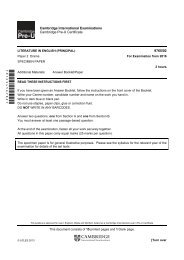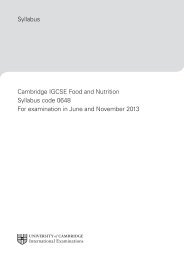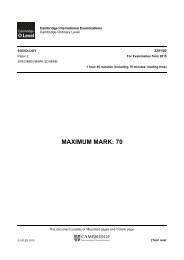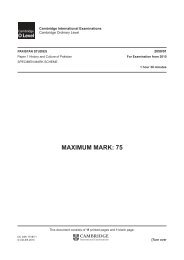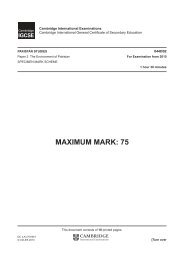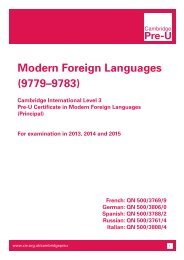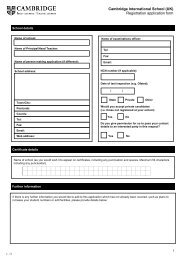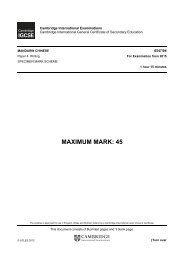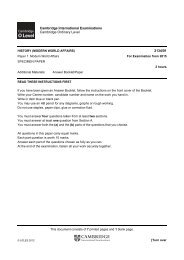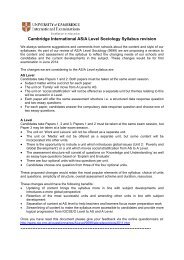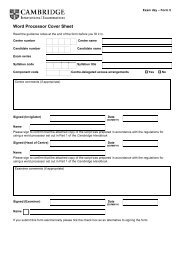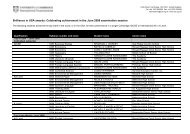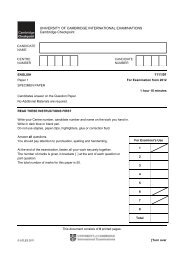Teacher's Guide Cambridge Pre-U MUSIC Available for teaching ...
Teacher's Guide Cambridge Pre-U MUSIC Available for teaching ...
Teacher's Guide Cambridge Pre-U MUSIC Available for teaching ...
Create successful ePaper yourself
Turn your PDF publications into a flip-book with our unique Google optimized e-Paper software.
<strong>Cambridge</strong> <strong>Pre</strong>-U Teacher <strong>Guide</strong><br />
The assessment of essays in this section of the paper will be based not only on the candidate’s ability<br />
to harness relevant in<strong>for</strong>mation and provide apposite illustrations, but also on the clarity of the<br />
argument in relation to the specifics of the question and on the quality of language employed.<br />
Component 41: Dissertation<br />
In preparing <strong>for</strong> this component, candidates are not expected to undertake original research or to<br />
tread new scholarly paths. They should, however, demonstrate a good understanding of current<br />
thinking about their chosen topic, close familiarity with a range of relevant music and sensible,<br />
in<strong>for</strong>med reflection about what they hear and study. On the other hand, a simple compilation of<br />
extracts from standard texts or a repetition of second-hand judgements about the music, unsupported<br />
by any evidence that the candidate has actually heard it, will not meet the assessment criteria. The<br />
presentation should offer reliable evidence of independent learning: to achieve this, however, all<br />
candidates will need their teacher’s supervision throughout the course and, in many cases, structured<br />
guidance as well. The perceptions and judgements in the final document will, nonetheless, be entirely<br />
those of the candidate, communicated in his or her own words.<br />
Ideally there should be regular supervision throughout the course. At the very least, teachers should<br />
expect to have close contact with candidates at three key moments:<br />
•<br />
•<br />
•<br />
at the start: choosing and framing a title and defining the scope of the project; assessing and<br />
locating necessary resources; drawing up a manageable timetable.<br />
in the middle: checking progress against the agreed timetable; reviewing the actual availability<br />
of resources; identifying stumbling-blocks and/or potentially unfruitful directions of enquiry.<br />
towards the end: prior to finalising the <strong>for</strong>m of the presentation, checking candidates’<br />
assimilation of their material; ensuring that all quotations and their sources are fully<br />
acknowledged; gauging whether the presentation can be readily handled and understood by<br />
the reader.<br />
When choosing a title, candidates must be advised about the practicality of their suggested topic. Is it<br />
too large a subject to be possible to address within the limit of 3,500 words? What skills are needed?<br />
Do the individual candidates possess those skills, or the potential to develop them quickly enough?<br />
Do they have access to adequate, reasonably scholarly resources? Above all, what music will they<br />
need to listen to and become familiar with? At a time when students usually turn first to the internet<br />
<strong>for</strong> their initial research, it is all too easy <strong>for</strong> them to overlook the need <strong>for</strong> recordings and scores,<br />
yet these are the essential tools without which they cannot <strong>for</strong>m their own judgements or learn<br />
independently.<br />
While candidates will benefit from guidance, particularly in being steered away from topics that are<br />
too broad, or <strong>for</strong> which resources are not readily available, it is important that their interest should<br />
be engaged: they should not be directed towards an unwelcome topic. Whatever the candidates’<br />
level of intellectual and musical ability (and this, too, needs judicious assessment in terms of whether<br />
a particular topic is feasible <strong>for</strong> a particular candidate), the project is more likely to be carried to a<br />
successful conclusion if the topic arouses at least some curiosity, or preferably real enthusiasm.<br />
www.cie.org.uk/cambridgepreu 65



